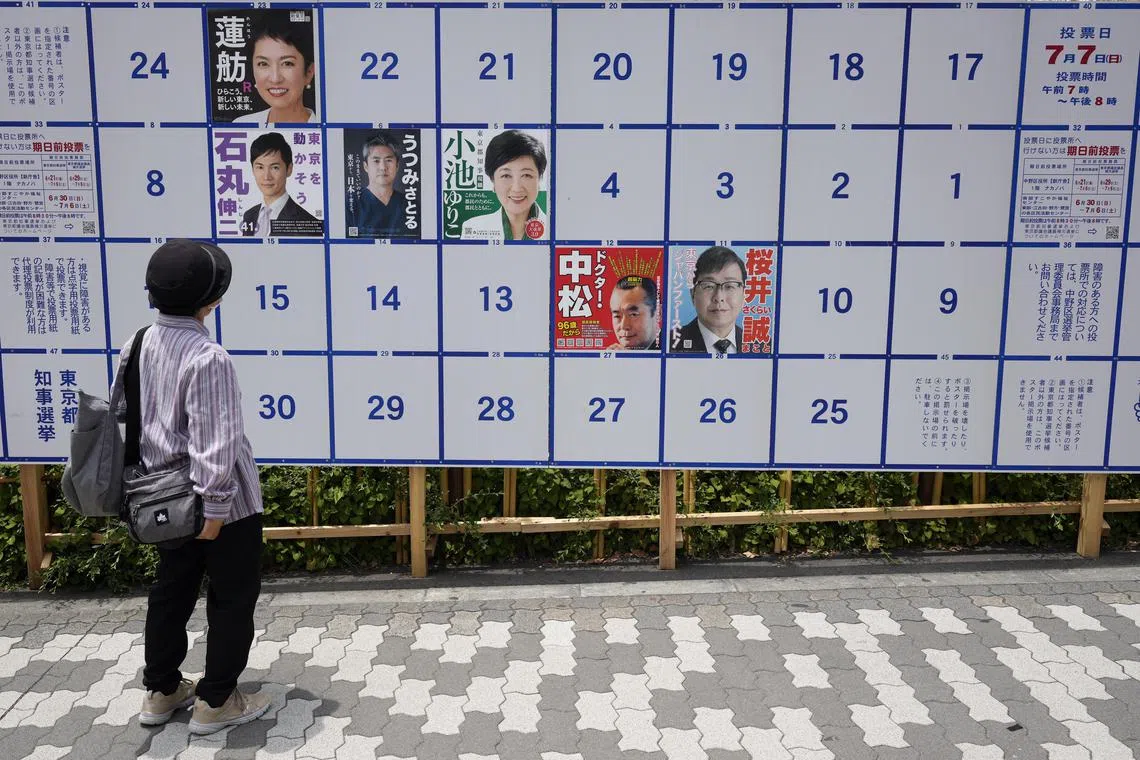Joke candidates flood Tokyo’s governor race
Sign up now: Get insights on Asia's fast-moving developments

A record 56 people are running in the July 7 election, where two women are vying for the top post.
PHOTO: EPA-EFE
Follow topic:
TOKYO – Large poster boards promoting candidates for Tokyo’s upcoming gubernatorial election are visible all over the city, but in a historic race where two women are vying for the top post, a host of controversial candidates – and their posters – are capturing much of the attention.
A record 56 people are running in the July 7 election, where incumbent Yuriko Koike is fending off a challenge from the opposition’s Renho Saito.
The two women are campaigning on issues such as the falling fertility rate, public spending, and even the future of a major city park, and the election has important economic implications for Japan as well as the current national government. The latest polls show Ms Renho, as the candidate is known, trailing Ms Koike.
Among the remaining 54 candidates is a man dressed as The Joker, who supports freedom of sexual expression, including allowing polygamy to help Japan’s falling birth rate. He even enlisted the help of a model to promote himself and used explicit posters that were later taken down.
Other figures include a masked “internet comedian”; AI Mayor, a former professional wrestler whose posters show a metallic robot; and a female candidate from the Poker Party who advocates for economic and political change through the card game.
Joke candidates are not unique to Japanese elections – in the UK, for example, Count Binface and Elmo are mainstays in elections.
In Tokyo, 96-year-old serial inventor Yoshiro Nakamatsu – who claims he invented the floppy disk – has stood in the gubernatorial race eight times.
However, some analysts say the growing sway of social media is worryingly turning elections into a contest for virality. Mr Shinji Hirai, governor of Tottori prefecture, said in remarks to the local assembly on June 24 that the chaos on display in the Tokyo election showed that “democracy is at risk of collapse”.
Dr Donna Weeks, an emeritus professor at Tokyo’s Musashino University who specialises in political science, said: “It’s almost a disdain for the democratic process at the same time as wanting to participate in it. It’s the age we live in, isn’t it? I think people will look at this election and think, here’s a way that I can raise my profile.” She said that only “about 10” of the candidates are serious about the election process.
Japanese law prohibits candidates from running paid online advertisements, distributing documents or canvassing houses, in order to make elections a more level playing field. However, all election candidates are given free, equal airtime on public broadcaster NHK.
One such campaign broadcast on June 27 showed Ms Airi Uchino from the “Watch My Cute Political Broadcast” party, who in her six-minute appearance took off her shirt and asked viewers to add her on messaging app Line – all while a sign language interpreter stood in the background signing her words.
A gubernatorial candidate must pay a deposit of three million yen (S$25,000) to the authorities, and forfeit that amount if he or she fails to get at least 10 per cent of the vote.
Assistant Professor Michael Cucek, who specialises in Asian studies at Temple University’s Japan campus, said: “Some individuals seeking attention see three million yen as a reasonable price to pay to gain access to both the poster boards and the free airtime on NHK.”
The NHK Party, which was founded to oppose the broadcaster’s licence fee, and affiliated parties are officially fielding 24 candidates, but have in fact been allowing anyone who donated to the party to display posters on their allocated spots. That has allowed photos of corgis, babies and influencers with QR codes linked to their social media accounts to be shown next to those of official candidates.
Party leader Takashi Tachibana called the “hijacking” of the posters “a great success”, according to local media.
Such promotional acts are “not illegal, but they don’t abide by the original purpose”, said Dr Tetsuro Kobayashi, a professor at Waseda University who specialises in political communication and public opinion. “Until now, despite this freedom, the norm that the election campaigns should not be used for private gain was observed, but people are beginning to not comply with these norms.”
Mr Hirai, the Tottori governor, said that if people in his prefecture were to use campaign hoardings for commercial purposes like in Tokyo, he would put a stop to it. He suggested that after the gubernatorial election is over, the authorities should consider revising electoral laws.
At a time when election turnout rates in Japan have broadly been decreasing over the years, Dr Kobayashi said the fracas in Tokyo threatens to overshadow serious electoral issues and further worsen voter apathy. “It may increase political cynicism due to the collapse of norms and the election becoming more like entertainment,” he said. Bloomberg

